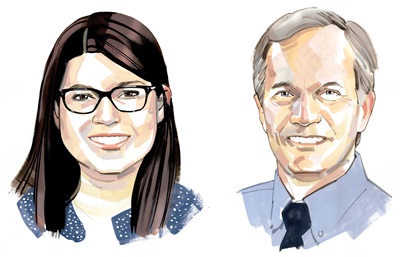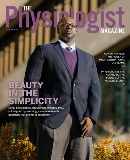Focus on Teaching
How to develop your own teaching philosophy.

Each issue, we ask a trainee member to pose their career questions to an established investigator and mentor. Here, Victoria Wolf, PhD, visiting assistant professor at Gettysburg College in Pennsylvania, asks Scott K. Powers, EdD, PhD, FAPS, distinguished scholar of health sciences at Stetson University in Florida, for advice on becoming a great physiology teacher.
Q: Do you have any tips for trainees who are trying to develop their own philosophy of teaching?
A: Many useful teaching resources are available from APS, such as articles in Advances in Physiology Education,
and I encourage trainees to read and digest the viewpoints conveyed in these writings. Many of the published articles are written by master teachers and contain the pedagogical wisdom earned through many years of teaching experience. I also encourage
beginning teachers to reflect on their own educational experiences and to incorporate those teaching techniques that were most beneficial during their training.
Q: Should trainees have a teaching mentor separate from their primary research mentor?
A: The answer to this question depends upon whether the research mentor is a highly effective teacher, that is a master teacher.
If yes, I do not believe that a second mentor is required. In contrast, if your research mentor is not engaged in teaching, then working with a master teacher mentor will be highly beneficial.
Q: When beginning to search for teaching positions how do you decide what type of institution would be the best fit?
A: Choosing your first academic position following your graduate and postdoctoral training
is an important and challenging decision. There are many factors that go into this decision, but deciding whether your primary career goal involves research or teaching is key to making a good decision. Obviously, academic positions at R1 universities
require excellence in research and often limited teaching is required. In contrast, many private liberal arts colleges and small state universities expect faculty to engage in research, but the primary job description is a focus on excellent teaching.
The question now becomes which of these positions is the best fit for your career goals?
Q: What do you think is the biggest challenge new physiology educators will face?
A: This is a great question, and I predict that the answer provided will often differ between experienced teachers of physiology.
However, in my view, one of the greatest challenges is how does the physiology teacher remain current in multiple areas of physiology? Obviously, a teacher/researcher is well-versed in topics related to their research, but remaining current in areas
of physiology outside their sphere of investigation is often challenging. However, the growing numbers of published reviews and the “refresher courses” published in Advances in Physiology Education are excellent ways to remain in touch with numerous areas of physiology outside your research focus.
Got a career question you'd like to submit? Email it to tphysmag@physiology.org. We may use it in an upcoming Mentoring Q&A.
This article was originally published in the July 2022 issue of The Physiologist Magazine.
“I also encourage beginning teachers to reflect on their own educational experiences and to incorporate those teaching techniques that were most beneficial during their training.”
The Physiologist Magazine
Read the Latest Issue
Don’t miss out on the latest topics in science and research.
View the Issue Archive
Catch up on all the issues of The Physiologist Magazine.
Contact Us
For questions, comments or to share your story ideas, email us or call 301.634.7314.


